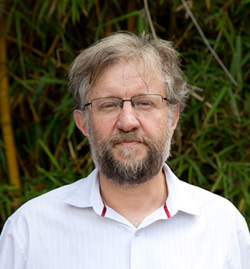Global health mentorship today: Gabriel Trueba, DVM, PhD
July/August 2024 | Volume 23 Number 4
 Photo courtesy of Universidad San Francisco de QuitoGabriel Trueba, DVM, PhD
Photo courtesy of Universidad San Francisco de QuitoGabriel Trueba, DVM, PhD
Gabriel Trueba, is professor and director at the Instituto de Microbiología, Universidad San Francisco de Quito, Ecuador.
I studied veterinary medicine here in Ecuador as an undergrad. I wanted to know more about many things, but Ecuador basically didn't offer anything else. Then I studied veterinary microbiology at Iowa State University, was research assistant there, and then an adjunct professor at University of North Carolina, Chapel Hill. It was a fantastic experience to see the contrast between the education in Ecuador versus education in the U.S., two different things completely. I thought we should offer something for students who want to learn more in Ecuador, and that's why we started the postgraduate microbiology programs here at Universidad San Francisco de Quito.
A great mentor is someone who changes you fundamentally, helps shape the way you see what making science is all about—how you approach conflicts, frustrations or even successes that you have. Some of my professors completely changed the way I see all the underlying issues of the scientific work I do. I’ve remained friends with them.
Mentors who have a lot of experience are best. The older they are and the more experience they have, then the way that they see is more evolved. Probably I say this because I'm getting old and I appreciate the way I think now compared to when I was young! My training and mentoring of students is based on the U.S. model, and I'm trying to introduce this into our program here.
It's important to understand the interests of the mentee. What moves them? What is the main goal in their lives? Also, mentors should try to explore whether mentees are interested in science for the right reasons. Some students, especially in Ecuador, don't realize that getting a doctorate involves a lot of dedication, a lot of time trying to truly understand what you are trying to investigate and resolve. In the U.S., students see scientists and know that scientists spend a lot of time reading and doing experiments and thinking about experiments, but we are in a country that doesn't do much science. I think this is a problem in all poor countries—the amount of research done is the minimum. So when I mentor, I try to get them to understand the difficulty of becoming a PhD and a scientist.
I also teach them about research ethics. The main difference when mentoring in the global health space (compared to other fields) is bioethics, working with human subjects. I emphasize that there are many degrees of difference between working with animals and working with humans. I spend a lot of time on bioethics—the respect you must have for the people involved in the studies and the responsibility of the data you're producing. I always emphasize that it doesn't matter if you fail in your experiments, so long as you are honest. That is really very important.
I don't see any differences when it comes to mentoring female or male students, but it’s very important that mentoring be flexible. You shouldn't have a structured way of mentoring. Each person is different with different strengths and challenges, so you have to adapt to each.
Mentees often don’t understand the amount of failure involved when doing experiments—that’s striking for many people. They always think that everything you do, you publish. That's not it. You have to do many trials until there is something that could be published. And then they are confronted by the response from journal editors, the response from reviewers—that is also shocking for some of them.
Some mentees become frustrated with the idea of venturing into uncharted terrain and start thinking they are headed in the wrong direction. With these students, I try to convey some confidence, so they have trust in what I'm trying to do and what they’re trying to do. Then there are mentees who are highly motivated and become fascinated by science and almost obsessed with a topic. They are the easiest to mentor, because, as I see science, you have to immerse yourself in an idea to resolve it… though whether you accomplish that or not is a different story.
More Information
Updated March 7, 2025
To view Adobe PDF files,
download current, free accessible plug-ins from Adobe's website.
Related Fogarty Programs
Related World Regions / Countries
Related Global Health Research Topics